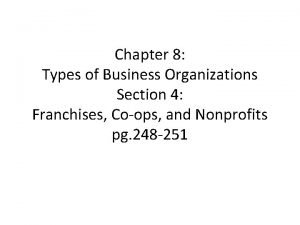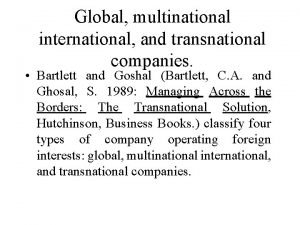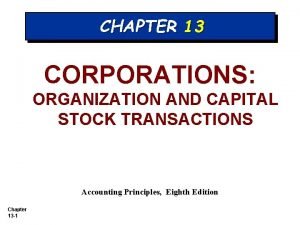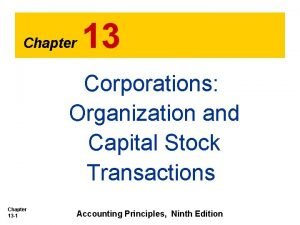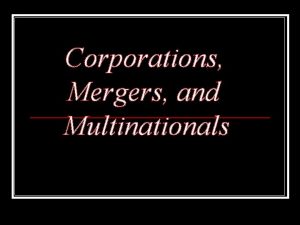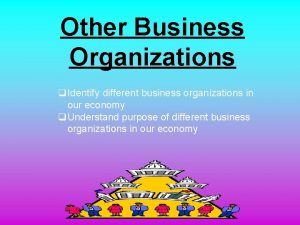Corporations Other Organizations 8 3 Corporations Legal wdistinct










- Slides: 10

Corporations & Other Organizations (8. 3)

Corporations • Legal w/distinct existence separate from the people who organize/own/run it • Corporations can: – Earn profit – Lose money – Be sued – Commit crimes • Account for over 85% of all sales in the U. S.

Articles of Incorporation • Written application to a state seeking permission to form a corp. • State issues a charter assuming the articles comply w/state & federal laws – Charter gives permission to organize as a corp. • Board of directors elected to run corp. • Owners of corp. issued shares of stock – Share in corp. profits – Votes in new board members

Types of Corporations Private • Few people own stock in corp. • Stockholders rarely sell their shares; pass then onto other family members Publicly traded • Many shareholders, can number into the millions • Many are buying/selling stocks • Larger than private corp.

Advantages of Corp. • Easier to raise financial capital – Most effective structure to raise $$$ – Large number of shareholders give corp. access to large resource of $$$ • Limited liability – Shareholders are liable for any debts owed, but personal assets would not be touched

Advantages of Corp. • Specialized management – Ownership is separated from management of the corp. , so experts can help run the corp. • Unlimited life – Does not cease to exist if a major shareholder dies/leaves

Disadvantages of Corp. • Difficult/Costly to start – Creating articles can be difficult & costly to draw up – Govt. could reject the articles, thus starting the process over again • More regulations – Issue financial reports every 3 months – Issue annual report to independent accounting firm – All reports must be filed with SEC (regulates corp. stock trading)

Disadvantages of Corp. • Owners have less control – So far removed from day-to-day operations that owners don’t really know how corp. is being run • Double taxation – Corp. pays taxes on its earnings (corp. income tax) – Shareholders then pay taxes on any earnings they receive from its stocks (personal income tax)

Hybrid Businesses – S Corp. • Business must: – Be incorporated in U. S. – Have no more than 75 shareholders – Must not have foreign stockholders • Allows for limited liability like corp. , but is also taxed once like sole proprietorships/partnerships

Hybrid Businesses – Limited Liability Company (LLC) • Business must: – Have 2+ members – Can allow foreign investors – Member can personally guarantee certain obligations LLC will fulfill • Allows for limited liability like corp. , but is also taxed once like sole proprietorships/partnerships • Considered to be financially flexible for managers
 Chapter 8 section 4
Chapter 8 section 4 Chapter 8 section 4 other organizations
Chapter 8 section 4 other organizations Strategic management a dynamic perspective
Strategic management a dynamic perspective Multinational vs international
Multinational vs international Accounting for corporations chapter 13
Accounting for corporations chapter 13 Chapter 6 corporations act
Chapter 6 corporations act Characteristics of corporation
Characteristics of corporation Characteristics of corporation
Characteristics of corporation Types of corporations
Types of corporations Chapter 7 corporations act
Chapter 7 corporations act Multinational company organizational structure
Multinational company organizational structure
